Our meaningful collaborations
-

Shades of India
Founded by David Housego and Mandeep Nagi, Shades of India creates indigenous textile crafts interpreted with simplicity, on hand woven fabrics, in comfortable silhouettes and with unexpected details. Their designs are balanced between a delicate aesthetic and wearability, emotionally charged with love and attention to craftsmanship.
"Our passion for textiles has grown every year, starting with the discovery of the language of textiles in tribal weaves, the sense of colour, the geometric designs, the more we explore, the more fascinated we become. In India, with the richest textile culture of anywhere in the world, the wealth of this legacy inspires us every day."
- David Housego and Mandeep Nagi
-

Studio Coppre
Coppre is a social enterprise which is a culmination of a sustainable livelihood project started in 2011.
It reflects the legacy of metal craftspeople and is the outcome of a creative collaboration with the Tambat metal craftspeople, to evolve and design a contemporary range of copper products that cater to the present while retaining the heritage of the craft process.
The organisation works with the Craftspeople, by contemporising their products for the current sensibilities thereby making the old relevant in the new. The organisation’s multi pronged approach comprising financial, design and market interventions, has helped to revive the dying traditional Copper Craft form of Maharashtra.
The organisation cares deeply about the interests of the artisan communities they work with. All the products are priced in a way that ensures that the artisans make a fair deal from the sale of each and every product that is laboriously crafted by them.
-
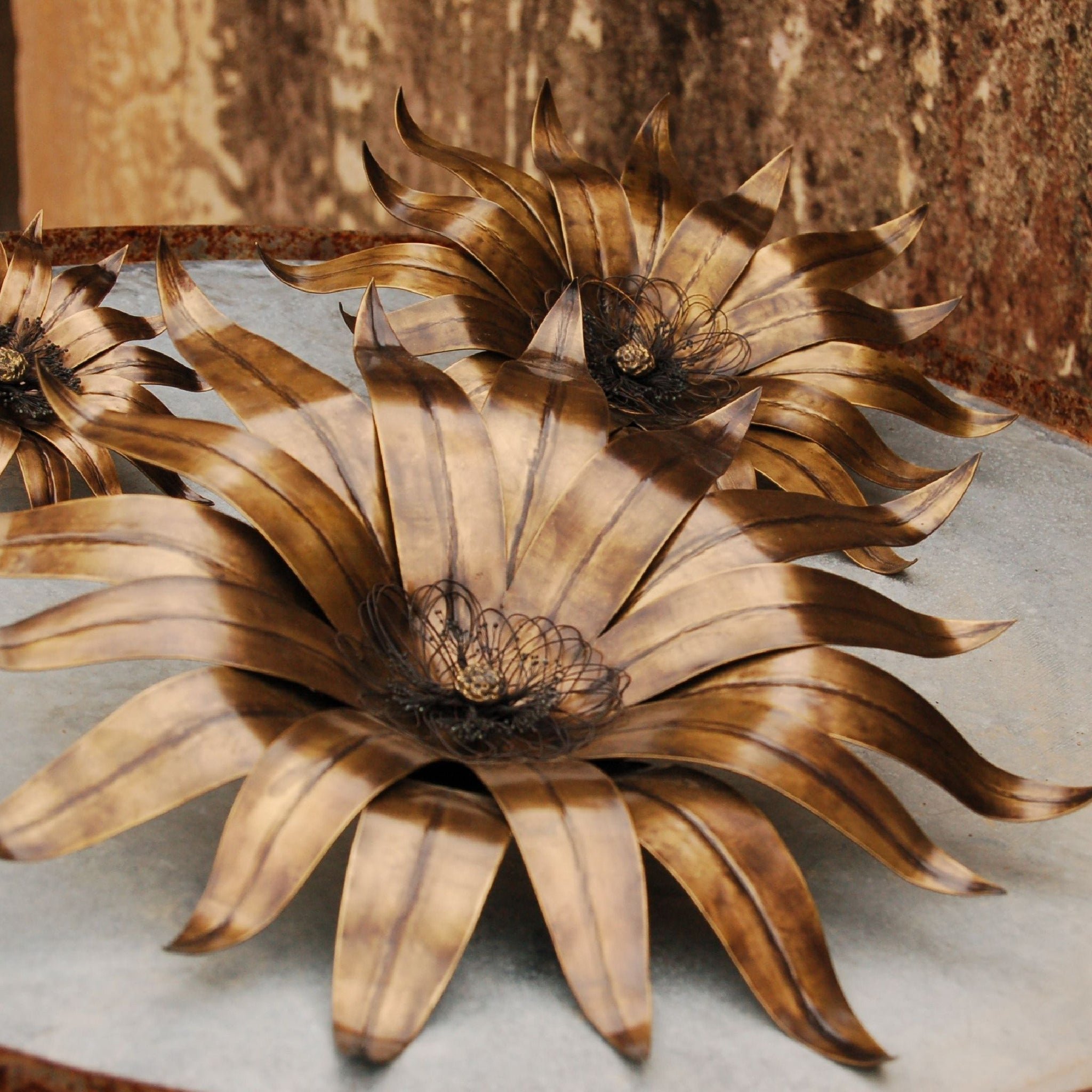
Anantaya
"Crafted objects with meaning and memorable style for contemporary living."
Anantaya is a globally recognised interdisciplinary lifestyle design studio of Ayush Kasliwal (designer) and Geetanjali Kasliwal (architect) based in Jaipur, India. AnanTaya is committed to the development of innovative new ideas through understanding the importance of preserving traditional crafts. AnanTaya creates home accessories, gifts, textiles, lights, furniture, tableware and more. Rooted in ancient craft practices, their collection is infused with Indian culture and a sense of place destined for a contemporary international lifestyle. Through inclusive business practices, working with artisans from Rajasthan and throughout India, AnanTaya redefines existing craft traditions and artisan communities by providing design, technology, capital, and creative collaboration.
AnanTaya products received the UNESCO seal of excellence in 2016, 2007 and 2008. The organisation believes that crafts can be a part of our everyday life, and that crafts, like any other industry, are a source of meaningful employment. They practice fair trade, promote the empowerment of women and support artisans’ livelihoods through innovative design, meaningful storytelling and effective manufacturing processes.
-

asal
Founded by Shripal Shah, Asal’s aim is to bring wholesomeness and sustainability into the lives of people through products that are organic and chemical free in origin. Asal believes in nurturing with nature and tradition and offers an alternative approach to living, one that is in harmony with the environment and with one’s own body.
-

Avani-Earthcraft
Founded by Rashmi Bharti, Avani is nestled in the Kumaon region of the Indian Himalayan state of Uttarakhand. Avani is a community built on the principles of sustainability and local empowerment. A global network of diverse employees, interns and volunteers give life to Avani’s community-centric rural development programs.
In a region where small farms are many families only source of income, Avani is a hub of opportunity; constantly developing new approaches to sustainable, conservation-based livelihood generation for rural communities.
Avani has been working extensively with the preservation and revival of the traditional craft of weaving, spinning and natural dyeing. The philosophy has been to introduce modern raw materials to make contemporary products while conserving the handicraft skills as livelihood options.
On International Women's Day, President Ram Nath Kovind presented Avani with the "Nari Shakti Award", the highest civilian honour for women, in recognition of Avani's service towards Indian society and women’s empowerment.
-

Samoolam
Samoolam started as a grassroots, social movement in 2009 that was both inclusive and sustainable with the intention of generating livelihood for a few economically-deprived rural women in Gaya (Bihar, India) — home to the legendary Gautama Buddha. Over the years, the organisations planning, training, co-ordination, collation, manufacturing and retail in turn has resulted in each woman in their network becoming self-reliant enough to earn and support her family financially.
The idea was to create everyday accessories using the one-needle yarn knitting art of crochet (derived from French ‘croc’ or ‘croche’, which means ‘small hook’).
The design philosophy has been clear and minimal — to create products that are useable and cost-effective. The designs are inspired by nature and everyday items to narrate the design stories. Their team of rural women handcrafts multi-colour crochet yarns into interesting shapes. They use these elements (birds, animals, flowers, whorls, fruits, emojis, cords, tassels, laces and more) singularly or bunch them up to make utility products for women, kids, home, travel, and stationery.
Image and text source-Samoolam
-

M. Rm. Rm Cultural Foundation
The M.Rm.Rm. Cultural Foundation was started in the year 2000 by Ms. Visalakshi Ramaswamy. It is a non-profit organization that supports and undertakes documentations of, and works towards the revival of rural crafts, textiles and architecture that are fast disappearing today.
The Foundation helps traditional crafts people, especially women, adapt to change and regain their place in the economic mainstream and become self-sustaining producer groups with direct marketing ability.
-

Varnam Craft Collective
Varnam Craft Collective, founded by Karthik Vaidyanathan is a multi-award winning social enterprise that has been working with artisans in Channapatna since 2012. The result is a series of designs interpreting this 200 year old toy-making craft in the home & lifestyle space that includes lighting, Kitchen, dining & bar accessories , kids room décor/toys and Jewelry.
In an industry where more than 90% of the artisans are men, many of Varnam’s creations have been deftly hand-crafted by women artisans. The organisation has been providing sustainable livelihoods on a consistent basis to artisan groups in Channapatna and also other craft clusters within India.
-

Collective Craft
Collective Craft is an artisan centric design initiative started in Odisha – a land of many magnificent and magical crafts traditions. The organisation engages traditional crafts skills in contemporary product and space design and works towards creating environmentally responsible design solutions.
The design process begins with an exploration of the Craft – its materials, techniques and skills. The team study the existing craft language, explore the comfort zone of the Artisans and then design the products. The Artisan is involved and engaged at every stage of the process to ensure that they comprehend and understand the context and application of their skills. The constant challenge is to help the Artisan find relevance for their work in a changing world.
-

House of Wandering Silk
Founded by Katherine Newmann, House of Wandering is a purpose-driven company, and they believe in the power - and responsibility - of business to do good. "To do good" means adding positive value along the length of our entire value chain.
For the organisation , textiles are not just textiles; they’re stories. That’s because their cloth is made by hand from beginning to end, bringing together the skills, traditions and cultures of artisanal communities from across Asia.
-

Ochre Ceramics & Pottery
Ochre was conceived in 2000 in Gujarat, India, by two professionals, Kavita Pandya Ganguly, a ceramic designer from NID & Titas Ganguly, a self taught potter & a trained rural pottery visualiser. Ochre is involved in the training of local rural youth to help create a sustainable income.
-

Tara Books
Tara Books is an independent publishing house started in 1994 by Gita Wolf. Many of their books evolve through collaborations with designers and artisans and include long and intense dialogue. These collaborations also include workshops, which often lead to projects that stretch beyond the book.
-

Doodlage
Doodlage stands for everything sustainable, and has been constantly researching and trying to find new ways to deliver something which is good for the planet and makes a difference, all this while making its community look better with every new look it serves.
The brand upcycles factory waste into short limited edition collections and recycle post consumer waste and post cutting scraps into new fabrics to create season-less well finished garments made for longevity. What is wasted is segregated and converted into accessories, soft furnishing products and paper to make into packaging or stationery products. All the pieces and fabrics are made with ethical production units and the packaging is designed to be plastic free.
-

Indegene
Sustainability is a part of being socially conscious, it is about long-term relationships. Indigene continues to work with its first set of partners, artisans and needle-workers, who came on board when it started, even as it expands its network of craftspeople every year. As a label, it’s proud of its long yet ethical supply chain and the many hands involved in producing each garment.
An organically growing label, Indigene works closely with skilled artisans and local communities (trained) for production. It believes in fair, deep-rooted partnerships, nurtured by constant learning and training.
-

Studio Saswata
Studio Saswata founded in 2013, has thrived with thoughtfully designed objects with authenticity and craftsmanship.
The design team, graduates of the National Institute of Design, thoughtfully design by giving character to everything, by exploring the world from a bit of history, to the new developments of products, extraordinary spaces and curiosities, flowing through the distinctive moods of intricate as well as minimal design.
-

Workshop Q
WorkshopQ is an innovative eco-product manufacturing company driven by the passion and belief that nothing is waste and they believe in the power of up-cycling as a sustainable solution for design.
-

(AIACA) Craftmark- The All India Artisans and Craftworkers Welfare Association
The All India Artisans and Craftworkers Welfare Association (AIACA), established in 2004, is a membership based non-profit organisation for the handloom and handicrafts sector in India. It seeks to ensure the growth and continued vibrancy of this sector and a better standard of living for artisans and crafts workers.
AIACA mobilises multi stakeholder collaboration for promoting handicrafts in India and empowers marginalised women communities through hand skills.
Over the past decade, AIACA has conducted policy research and advocacy on a range of issues including access to credit for crafts producers and environmental and health and safety standards for the sector; developed a crafts-certification system called the Craftmark; assisted sales and outreach of member producer groups and enterprises through commercial trade catalogues, trade fairs and order fulfilment; and assisted in developing and strengthening back-end production systems through a range of product design and business development services. The organisation has till date worked with more than 150,000 artisans across 23 states in India.
-
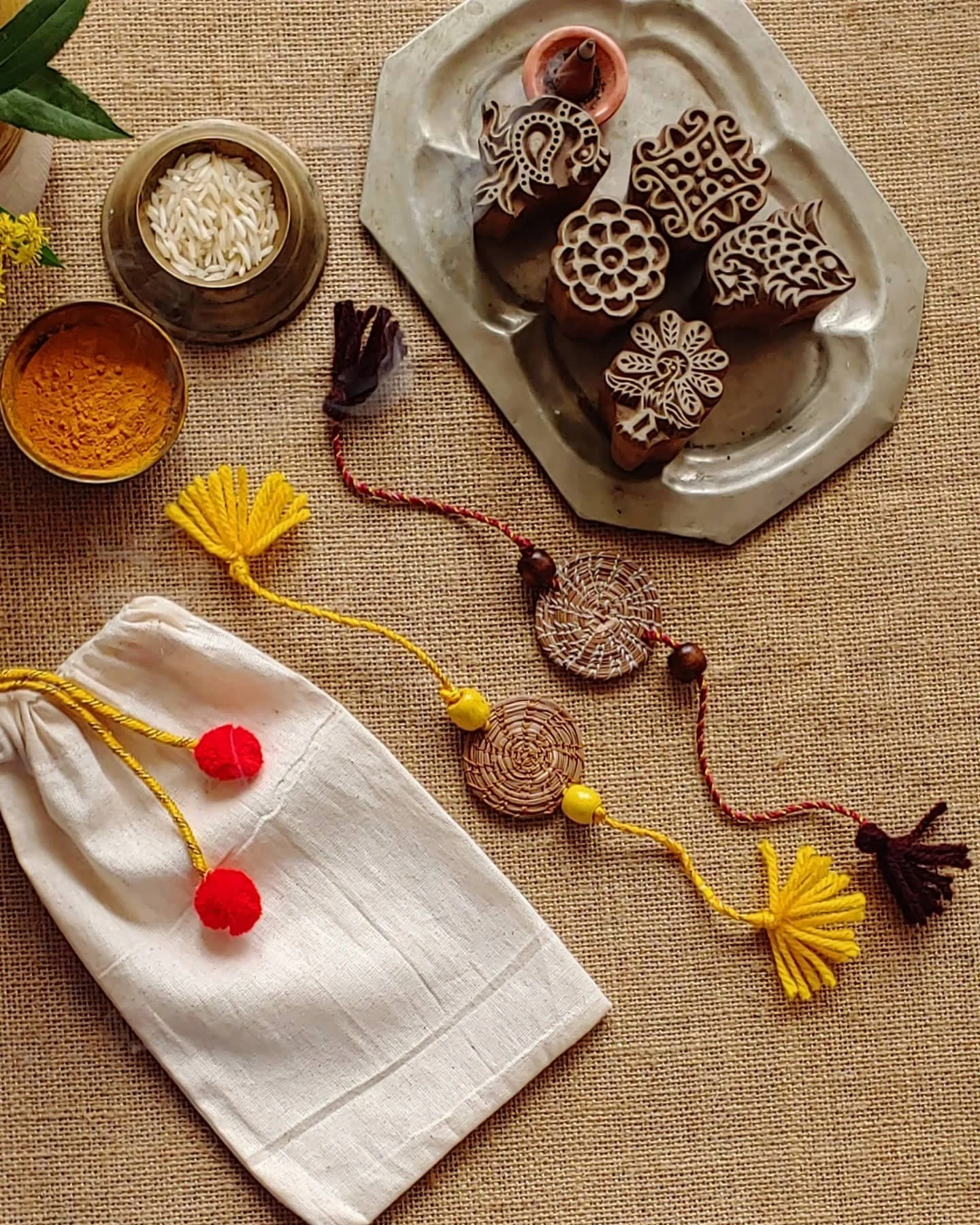
The Colour Caravan
Founded in 2010 by Swati Seth, The Color Caravan began its creative social venture by partnering with independent craftspeople, SHGs & NGOs to co-create products and help bridge the gap between artisans and the global market, thereby reviving the handicrafts as well as livelihood.
The organisation supports traditional craft communities, sustains indigenous craft skills, while up-skilling and empowering rural women. The objective is to help the craftspeople regain their place in the economic mainstream and offer the uniqueness that handmade has to offer.
-

Rehwa Society
A dwindling tradition revived by the REHWA Society, founded 35 years ago by Richard Shivajirao Holkar - the scion of Maheshwar's Holkar family to revitalize the weaving industry and improve the lives of the women weavers by providing them employment, housing, healthcare and education.
Today, over 1,500 looms are owned by villagers of the fortress town of Maheshwar in Madhya Pradesh. The weavers continue to be predominantly women. In the inner courtyard of the Maharani Ahilya Bai Holkar's qila or fort, under the old neem trees and in the airy rooms of the ancient Mughal style fort, the sound of the busy shuttles melts into the soothing breezes from the Narmada.
-

Anek Designs
Founded by Kanika Bahl along with her husband Vivek Agarwalla, Anek Designs is a Home Linen & Accessories Design Studio based in Gurgaon, India. The designers believe that the story behind the product is as important as the product itself and India is rich with such stories and heritage of traditional living crafts.
When sourcing Kantha or Kalamkari fabrics directly from the Artisans, the brand contributes towards keeping these crafts alive and relevant. At Anek Designs the duo strive to work with quality products, unique fabrics and attention to detail.
-
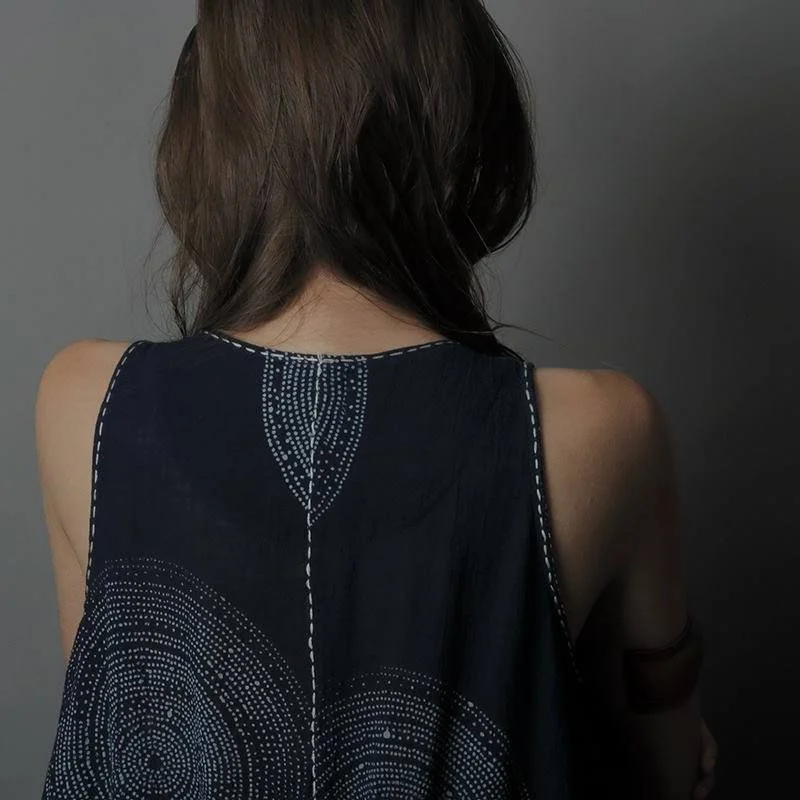
Tj & Li
Tj & Li believe true honesty in clothes lies in something more than just the superficial function of vanity. They have immense respect for design which has stood the test of time. Hence the inspiration is mostly derived from tribes of the world, old and new...Looking towards the tribes of India from the Munda's and the Rabari's to the story of 'Indigo' in Japan during the 'Edo' era.
Keeping the rich heritage of craft in India as the centre the they try and take inspiration from all over the world to bring a look which is an eclectic mix of day and night, old and new, fluid and structural, which is eccentric and blending, which reflects the impatient wanderer as well as the content settler.
-

Aavaran Udaipur
Steeped in the beauty and tradition of the Mewar region of Rajasthan, Aavaran was conceptualised to revive and sustain the traditional craft of Dabu, hand block printing.
The trademark of the Aavaran label has been fine and unique prints and motifs on indigo-dyed fabrics, chosen from a well-researched design and craft repertoire. Each collection of garments, home furnishings, and accessories uses Indigo and a selection of purely natural dyes that are painstakingly made with a commitment to being sustainable and eco-friendly.
-

Wellpaper Auroville
WOMEN EMPOWERMENT THROUGH LOCAL LIVELIHOOD
The primary goal of WELL is to empower local village women with skills to build, manage and maintain self-sustaining units. The women receive training, guidance and support in product development, market and team management, and personal development.
All Wellpaper products are hand-made and Eco-friendly, transforming recycled newspaper into art and accessories.
Over time, the women’s groups have developed into autonomous units, making their own business decisions towards their goal of financial independence. Today, some of the WELL women are conducting the training workshops themselves to reach other local women and small business units.
-

Kadam Haat
Kadam Haat founded by Payal Nath is a social organisation that works towards developing self-sustained rural business enterprise models that respond to current market requirements. For the past 14 years, the organisation has trained more than 1000 artisans and has brought together artisans from West Bengal, Orissa, Uttar Pradesh, & Kashmir to create sustainable handmade products designed by using natural fibres like Sabai Grass, Bamboo, Cotton & other natural grasses. The organisation has committed itself to the purpose of creating income-generating opportunities that combine the use of locally available natural raw materials and the traditional community knowledge of handcrafting to develop new contemporary products that have been designed keeping current market trends in mind.
-
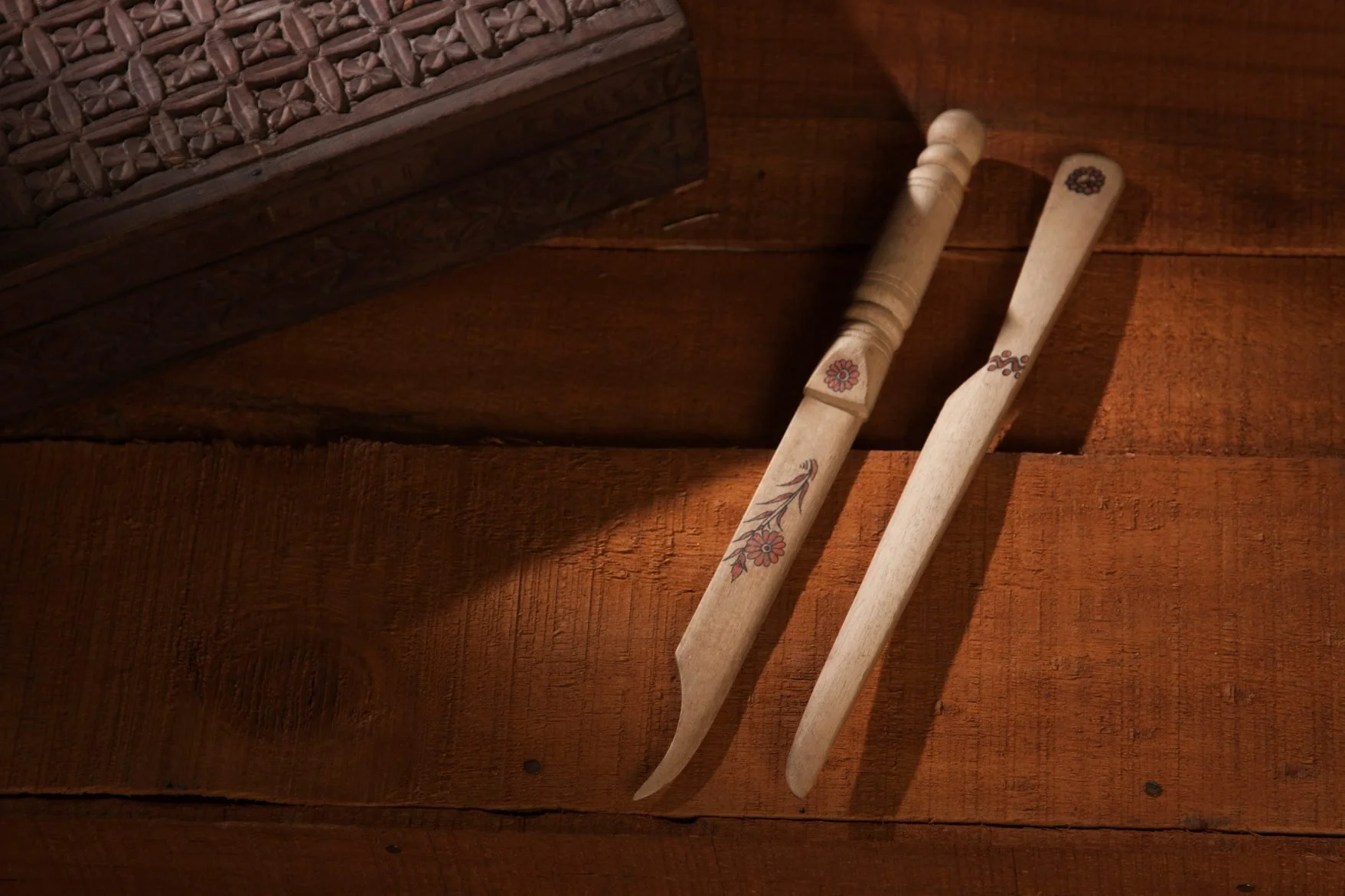
Sutra Crafts
Sutra is founded on a strong belief that it is possible to provide a self-sustaining model with dignity to the artisans. One of the the biggest challenges currently facing the artisans in India is the isolation from their markets along with ad-hoc policies and subsidies. These tend to prolong the existing situation and concerted efforts need to be made to organise the artisans, link them to contemporary markets along with enhancing their skill sets to deal with these challenges.
-

Dwaraka
Dwaraka is a network of rural women artisans initiated by the Dwaraknath Reddy Ramanarpanam Trust. DRRT founded DWARAKA (Development of Weavers And Rural Artisans in Kalamkari Art) over a decade ago in response to a dire need in the SriKalahasthi region where artists and weavers were being pushed into abject poverty due to lack of opportunities for their economic survival.
A new phase began in 2009 as DWARAKA PLUS (Peoples Livelihoods Upliftment Society) got registered as a society, with its first democratically elected committee of artisans. The artists in the Board and its members are today the proud owners of the organisation. The process towards empowerment of local communities is well founded within their organisation.
-
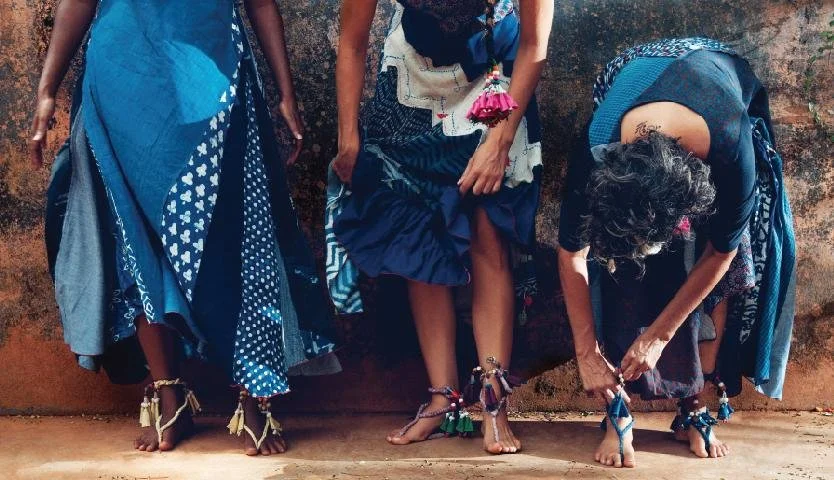
Upasansa
Upasana, a clothing company was founded by Uma Prajapati, a Fashion Designer, an Activist and an Entrepreneur who lives in Auroville, Tamil Nadu in southern India.
Clothing has power, the power to change lives. The lives of farmers, spinners, weavers, printers, tailors, designers and many more who have invisibly woven their souls into what we wear. Upasana honours them all, consciously, at every stage of crafting their products. Shifting fashion to touch the soul instead of just the body, the organisation believes life is interconnected. Beauty is beyond vanity.
-

Paruthi
With ’Paruthi’, Upasana decided to go ’Organic’ in 2011. Upasana has been running a campaign called KAPAS to promote sustainable business collaboration striving to protect and promote the fragile cotton communities of Tamil Nadu. Prauthi - the organic cotton brand is an extension of Project Kapas. It is a successful social experiment in sustainable practices.
-

House of Tuhina
House of Tuhina amalgamates the past, present, and the future to render them timeless.
The brand founded by Tuhina Goyal, a National Institute of Design (NID) graduate, draws inspiration from everything beautiful that Indian Design has to offer.
Working directly with skilled craftsmen, each product is an honest effort towards design and craftsmanship and the brand strives to retain the innate nature of each raw material used to conceive designs which are undisputedly authentic.
-

Boriya Basta
BORIYA BASTA is a brand that offers a unique mix of tradition, craftsmanship, & design. Every piece of BORIYA BASTA reflects the cultural threads of the lesser know Indian crafts and a journey to discover them and beyond.
The concept behind BORIYA BASTA is celebrating the rare and unexpected kilim bags by marrying old world traditions with new world design.
-

Shrujan Trust
Craft Revival and Craft Entrepreneurship Since 1969
Shrujan (meaning Creativity in Sanskrit) is a not-for-profit organisation working with craftswomen in Kutch to revitalise the ancient craft of hand embroidery. In 1969, Chanda Shroff visited Dhaneti village in Kutch to help in drought relief work. There she saw, in the exquisite hand embroidery displayed on the clothing of the village women, a way to enable them to earn a sustainable and dignified livelihood. Later that year, she founded Shrujan.
Long before the term ‘social entrepreneur’ became part of everyday discourse, Chanda Shroff had quietly and almost single-handedly initiated what was to become a grassroots movement of rural craftswomen across Kutch. Chanda Shroff’s vision has also helped revitalise and safeguard the ancient craft of hand embroidery.
Shrujan craftswomen create a range of beautiful hand embroidered items that are sold in the Shrujan shop located in Bhujodi and through regular exhibitions all over India and globally.
Over the years, Shrujan’s work has expanded to include research into and documentation of the diverse embroideries of Kutch, and the communities that practise these embroideries; we are also involved in other outreach activities in different parts of Kutch.
-

Naresh Siju-The Indigo Man
Master dyer Naresh Vankar Siju and his father Master Dyer Khengar Vankar Siju, live in the village of Bhujodi in Gujarat, India. They are working with traditional processes of natural dyeing with indigo and have been instrumental in safeguarding this legacy that has been passed down through generations of artisans.
-

RASA
After graduating in 1993 from the National Institute of Fashion Technology in Delhi, Madhulika Singh gained her Masters in textiles from the National Institute Of Design in Ahmedabad. Meanwhile, Manish Tibbrewal, also a graduate rom the National Institute of Fashion Technology in Delhi was working in Mumbai. They finally decided to make Jaipur their home in 1998. RASA was born.
At RASA, simplicity of design with the sustenance of the crafts and the environment forms an integral part of its activities. Today, RASA influences the lives of several hundred craftsmen and artisans. The workforce comprises a large majority of women, many of them having been part of the family since its inception.
While the quest for design refinement, craft conservation, social responsibility and environment sustenance is never ending, every small step in this direction is a celebration at RASA.
-

VrajBhoomi
Vraj:bhoomi is a concept clothing label founded by Bhoomi Dani & Priyam Shah, who have been working with desert artisans in transforming the traditional hand block printing skills to ethical aesthetic wear. The duo have been involved with the contemporary revival of a textile craft called “Ajrakh”, a form of hand block printing with resist dyeing using natural dye stuffs.
The brand is on a quest for the Indian contemporary, rooted in its traditions yet global in its charm. ‘Contemporary Revival’ as a design expression is held close and lies at the spirit of every creation. Unlike the commercial production process, the idea of an outfit at Vraj:bhoomi doesn’t start at design level - it begins as a shared effort between the designer and the craftsmen.
Being a textile centric label, they are intensely involved in researching, reviving and sustaining the inherent quality of traditional Indian crafts. They consistently seek to push boundaries in the creation of a new aesthetic using old-world and traditional processes. The label brings together Indian elements to a sensibility very global in appeal. The label focuses on comfort, ease and thus cotton in relaxed silhouettes characterise Vraj:bhoomi.
-

Atelier Lālmitti-To be added
Atelier Lālmitti is a clay studio located in the heart of the Indian Himalayas, near Dharamshala, in the village of Andretta. Nestled in a stunning location overlooking the Dhauladhar range of the Himalayas, it is a special place for the arts in general and ceramics in particular.
The name Atelier Lālmitti reflects the diversity of the setup. Atelier is ‘studio’ in French, while Lālmitti translates both as ‘precious clay’ in Persian and ‘red clay’ in Hindi. The studio is run by Élodie Alexandre and Reyaz Badaruddin, a ceramic artist duo from France and India. They collaborate for Atelier Lālmitti and also pursue their own practice as individual artists.
All their pieces are made and decorated by hand in their mountain studio. Combining simple and elegant forms with whimsical decorations, their work is cheerful and friendly, and they believe that handmade pottery enhances everyday life, and makes drinks and food taste better.
-

Looms of Ladakh-To be added
Owned by eight village Producer Groups. Run by elected office bearers. Social entrepreneurship. Crafts and pastoralism. Since 2016.
Looms of Ladakh is a Women’s Cooperative in Ladakh that works towards pashmina skill development along with reviving traditional utilitarian craft practices to realise sustainable rural livelihoods at the intersection of culture, ecology and economy.
-

We are KAL-To be added
We are KAL is a community of individuals who are all part of the creation of a product. They are farmers, spinners, weavers, nomads, designers, knitters and culture lovers who made it their goal to create meaningful products in harmony with nature and humanity.
They create value clothes which can be worn over decades and neither loose their elegance nor function. The evolution of raw materials into a final product is what we are excited about. They love the hand-making, therefore all of their fabric is hand-spun and hand-woven.
They believe that business is an opportunity to affect real and positive change in a society.
-

Taanbaan-To be added
Taanbaan presents Handspun Handwoven Organic Cotton Saris from heritage looms of master weavers nurtured by Rta Kapur Chishti. It offers an exclusive variety of indigenous organic cottons and low twist silks using hand spun yarns on the desi / traditional charkha / spinning wheel and thereafter woven on handloom.
Rta Kapur Chishti began the production of textiles of excellence in 1998 withavailable technology and in 2010, initiated Taanbaan to continue the revival and regeneration of the ancient Indian craft of hand-spinning and hand-weaving.
The Taanbaan range includes saris, dupattas, scarves and fabrics for garments and home furnishings distinguished by their unique textures, a contemporary rendering of traditional skills.
-

Discovering Roots-To be added
Discovering Roots is a trust that works in Jammu and Kashmir, India and is founded by Rajni Sharma, Entrepreneur and Venkata Krishna, Advocate Supreme Court of India with a vision to revive the vanishing Indian art traditions.
The trust is not funded by the government or any other organisation but is a passionate initiative of the couple. They have taken the first step to revive the lost tradition of handcrafting pashmina shawls in a small town of the state.
Discovering Roots believes in the principles of Gandhi: to make local handmade goods that are sustainable and eco-friendly. It aims to create a village-based economy that is self-reliant.